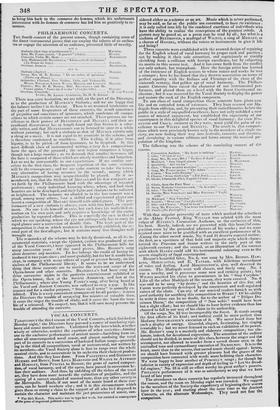PHILHARMONIC CONCERTS.
THE fourth concert of the present season, though containing some of the finest instrumental pieces that can employ the talents of an orches- tra or engage the attention of an audience, presented little of novelty.
ACT I. Sinfonia (first time of performance) MAURER.
Aria, Mr. PARRY junior, " 11 peusier"(Orfiw)
Concerto, Violin, Mr. Must BEETHOVEN. Aria, Mademoiselle BRA MD tLLA, " Elena, o tu elt' io eltiamo," (La Donna del Lap) ROSSINI. Overture, Leonora BEETHOVEN.
ACT II.
Sinfonia (Jupiter) MOZART. Scene, Mrs. II. H. BISHOP, un umbra di speranza," ( Pietro rem Ai. u) SI4MIR. Quintetto; Clarinet, Two Violins, Viola, and Violoncello, Messrs. WILLMAN, LODER, W Mottnur, and UxUusey Leader, Mr. Loose-Cunduetor, Mr. II. It. irmaor. MOZART. Terzetto, Mr!-+. H. R. 131.w.e, Mlle. I3R.auun.LA and Mr. PARRY juntor," Soave sia it vento "(Cesifita tutte) Moz ART. Overture, Eurganthe C. M. VON WESER. There was some hesitation, we arc told, on the part of the Directors, as to the production of MAURER'S Sinfonia ; and we are happy that the balance inclined in its favour. There is an assumed intolerance on the part of some frequenters of these concerts, the result sometimes of prejudice and sometimes of ignorance, which condemns all compo- sitions to which certain names are not attached. These persons are vo- ciferous in their praises of BEETHOVEN and Alozaicr ; and their se- condhand diseermnent has at length found out that Seona is a toler- able waiter, and that All:NDELsSOIIN can be listened to once in a while without yawning; but such a sinforlia as that of Maxima extorts only a shrug or a sneer. It is not equal to its associate in the scheme, and is therefore condemned as worthless. This feeling, if it arise from bigotry, is to be pitied—if from ignorance, to be despised. In this most difficult class of instrumental writing, a very fex compositions form the apex of the pyramid ; the next region comprises a larger, though not a large number ; as we descend, that number increases, till the base is composed of those which are utterly worthless and forgotten. Let us not be unreasonable in our expectations. If we confine our- selves to the first class, the frequent repetition of the same sinfonia will be the consequt ; and we are quite content to take the neces- sary alternative of having recourse to the second ; among which Mamma's composition may unquestionably Inc placed. Be it re- membered, too, that the Sinftmie of Mozma and his few compeers are act forth by the Philharmonic band with the advantage of repeated performance ; every individual knowing where, when, and how their beauties are to be developed, and their lights and shadows to be softened or heightened. The instance we alluded to in the last concert was a proof, among many others, how a skilful and experienced player can invest a composition of MoZART himself with added grace. The per- formaxce of a new sinfonia is always, even with this band, an experi- ment. No one feels himself at ease, bunt each fixes his undivided at- tention on his own part, and only acquires a knowledge of the entire production by repeated efforts. This is especially the ca-,c in that of which we are speaking, where the eye not unfrerplAitly has to carry its rapid glance over a succession of double flats. The weak port of the composition is that in which weakness is frequently exhibited, the se- cond part of the first allegro ; but it contains many fine thoughts well wrought up. The remainder of the scheme may be briefly dismissed, as all its in- strumental materials, except the Quintet, (which was produced at one of the Vocal Concerts,) have appeared in the Philharmonic bills for many successive years. Of the vocal pieces, Mrs. 13isitor's song alone deserves any mention. To her belongs the credit of having In- troduced it two years since ; and most probably, but for her it would have slept, in company with many others of equal or greater beauty, on the shelves of the Philharmonic library. It seems to be an understood thing that these concerts are to receive the wore-out songs of the Opera-house and other concerts. BRANIBILLA'S had been sung for three successive nights in the pasticciu entertaimnent exhibited at the Opera.house, then at the Socie6t Armonica, and last at the Philharmonic ; where also Young PARRY'S song, after being heard at the Vocal and Ancient Concerts, was suffered to-stop a gap. In like manner and for a similar purpose, " Soave sia it vento" is annually ex- hibited. This is a very convenient arrangement for all parties : it saves the Directors the trouble of occupying five minutes of valuable time, it saves the singer the trouble of study. and it saves the band the trou- ble of a rehearsal. We suspect, too, that it will save many persons the trouble of attending the concerts.


























 Previous page
Previous page